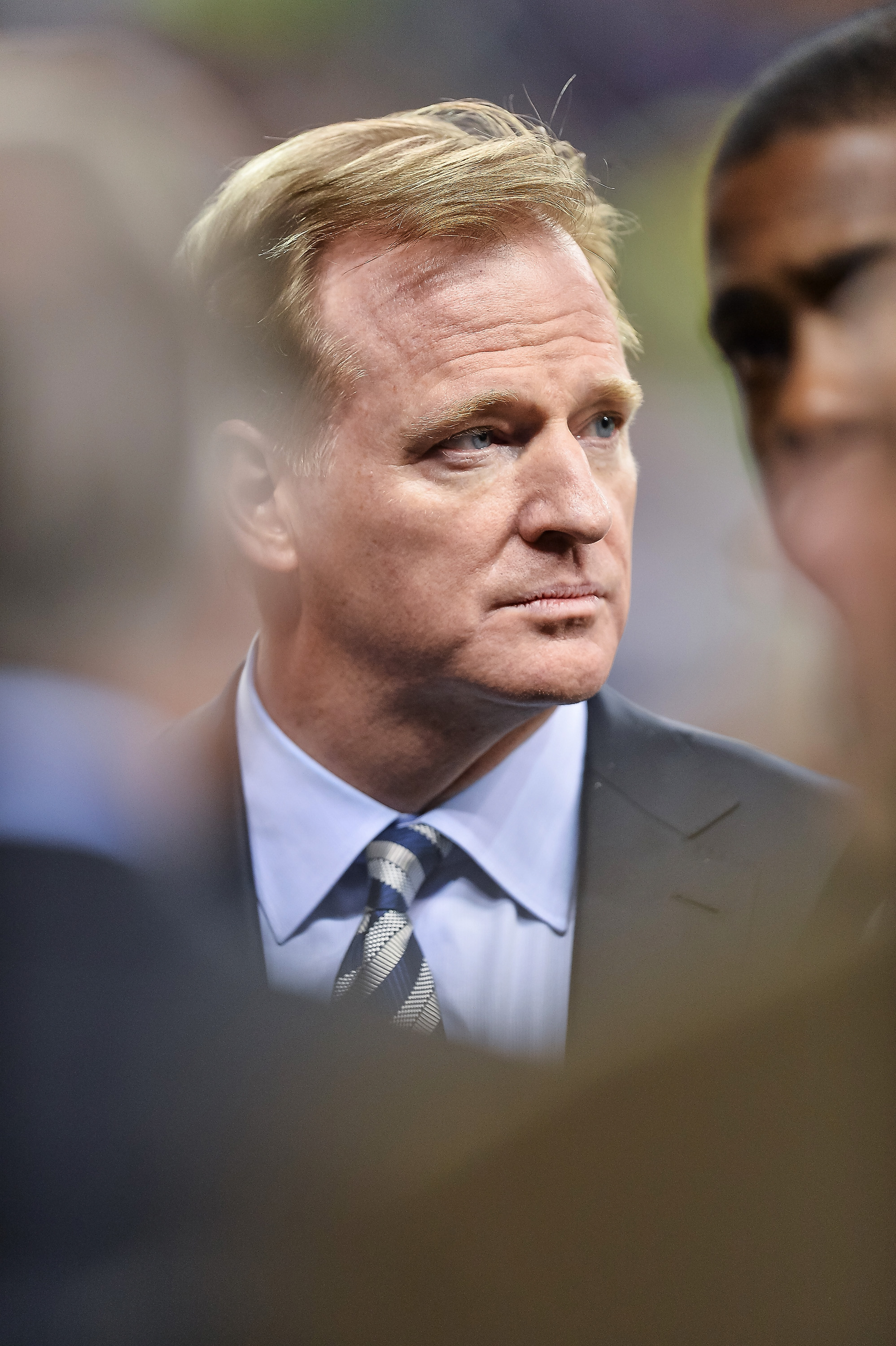
Roger Goodell talks a lot—an awful lot—about “protecting the shield.” He considers it one of his top priorities to keep the league’s image pristine. But what is he protecting the NFL’s red, white and blue logo from? Recent events indicate that it’s law enforcement, personal responsibility, and the public.
The NFL’s response to domestic violence incidents shows that its priority has been to protect the league’s image above all else, and that zeal for protecting the league’s image is now backfiring–and deservedly so. Too often, the single-minded focus on image has meant blaming and silencing victims, manipulating law enforcement, and/or misleading the public. The Ray Rice case is a good example, but not the only one, of how this works.
Victim blaming and silencing: During an argument in a hotel elevator, Baltimore Ravens star Ray Rice punched his then-fiancée (now wife) Janay Palmer Rice in the head, knocking her unconscious. Yet Ravens owner Steve Bisciotti managed to blame Janay: In two press appearances Bisciotti emphasized that Janay had been drinking; he said she provoked Ray; he even suggested she knocked herself out by holding her head too close to the elevator wall. The Ravens proceeded to script the press conference where Janay apologized for her “role” in the incident. Other survivors report being urged to keep quiet about their abuse, so as not to embarrass the team or harm their partner’s career. Better to keep it all in-house, attend counseling, and try to make the relationship work.
Manipulation of law enforcement. Police and prosecutors in Atlantic City, N.J., where the Ray Rice incident occurred, were well aware of the horrific nature of the attack on Janay. Yet prosecutors allowed Rice to enter a lenient pre-trial intervention program, a move so unusual that New Jersey Senate President Steve Sweeney called for an investigation. Similar questions have been raised in a host of other cases where the cozy relationship between the NFL and local police have helped abusers avoid accountability, including Ray McDonald, Ben Roethlisberger, Adrian Peterson, and Ahmad Brooks.
Misleading the public: Keeping victims quiet and tamping down arrests and indictments for domestic violence are one way to create a false impression about the incidence and severity of domestic violence in the NFL. In the Ray Rice case, though, the two damning videos made any attempt at minimizing impossible. Goodell’s fallback strategy: deflect attention from the NFL’s policies by demonizing the individual player. Goodell claimed repeatedly that he didn’t understand the seriousness of Rice’s attack because Rice misled him. That wasn’t so. An arbitrator has now ruled that Rice truthfully described exactly what happened in the elevator that night.
The NFL can rebuild its reputation, but to do so it must look beyond the surface and get to the substance. It must develop a policy that recognizes fundamental facts about domestic violence. Not gauzy stereotypes about men’s and women’s role in society, but actual facts.
First, any shock to an abuser’s sense of security–like being summarily fired–creates a significant risk of elevated violence. So before imposing harsh punishments, the NFL must have protocols in place to guarantee the safety of the victim, her children, pets, etc.
Second, the most important factor in a victim’s ability to get back on her feet and regain control of her own life is independent economic security. NFL wives and girlfriends frequently give up their own jobs and careers to follow their partners from team to team, raise the children and manage the households. The NFL profits nicely from this unpaid labor. The least it can do is guarantee economic security to a woman whose sacrifice has left her stuck, without the means to escape the violence and get a fresh start.
Third, like Janay Rice, survivors of domestic violence are strong, competent and compassionate people. They should not be judged for being protective of their partners, even if they are also fearful. They have the right to make their own decisions about how to move forward, and the league’s default posture should be to support their decisions. Stop blaming and silencing them. Start trusting them.
In his zeal to protect what Grantland calls “Goodell’s mythical shield…that is every player’s Constitution, Holy Bible, and secret handshake,” Goodell lost sight of what real reputations are made of: honesty, transparency, concern for others’ welfare and respect for their rights.
Now that Goodell’s attempt to deceive has been exposed, it’s clearer than ever that he cannot earn back the public’s trust in “the integrity of the game.” He must step down. At this point, the NFL’s image is tarnished beyond recognition. That shield is not just cracked; it is shattered.
Terry O’Neill, a feminist attorney, professor and activist for social justice, has been the President of the National Organization for Women since 2009.
More Must-Reads From TIME
- The 100 Most Influential People of 2024
- The Revolution of Yulia Navalnaya
- 6 Compliments That Land Every Time
- What's the Deal With the Bitcoin Halving?
- If You're Dating Right Now , You're Brave: Column
- The AI That Could Heal a Divided Internet
- Fallout Is a Brilliant Model for the Future of Video Game Adaptations
- Want Weekly Recs on What to Watch, Read, and More? Sign Up for Worth Your Time
Contact us at letters@time.com